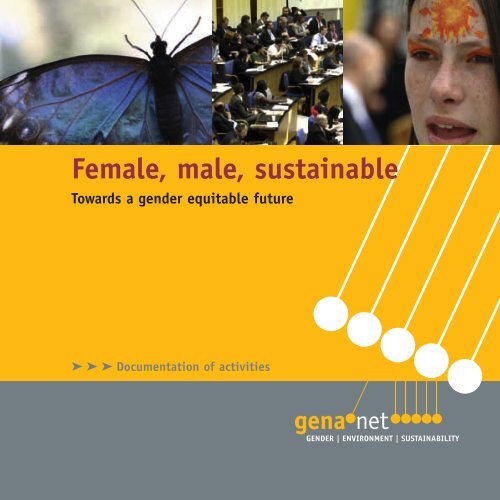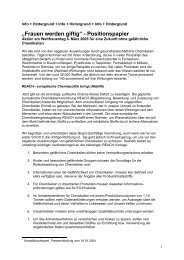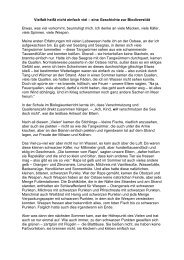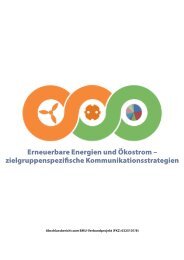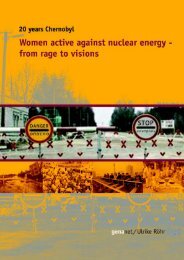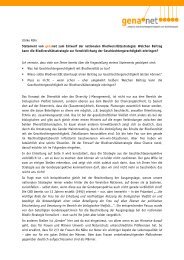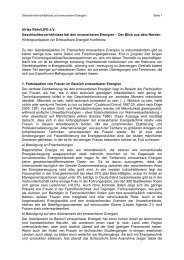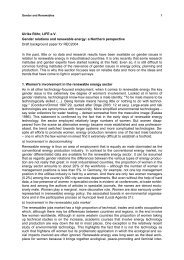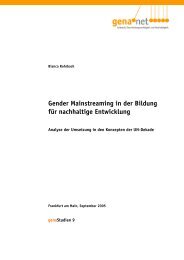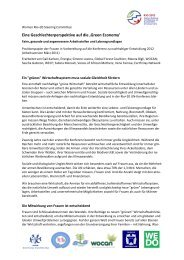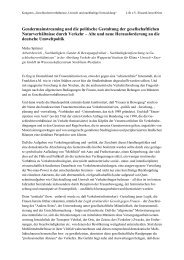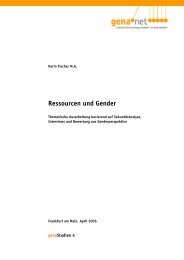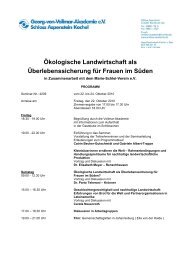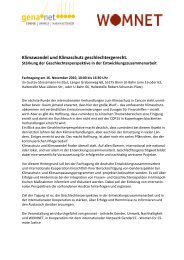Female, male, sustainable - genanet - Leitstelle GENDER ...
Female, male, sustainable - genanet - Leitstelle GENDER ...
Female, male, sustainable - genanet - Leitstelle GENDER ...
Create successful ePaper yourself
Turn your PDF publications into a flip-book with our unique Google optimized e-Paper software.
<strong>Fe<strong>male</strong></strong>, <strong>male</strong>, <strong>sustainable</strong><br />
Towards a gender equitable future<br />
➤➤➤Documentation of activities
CONTENT<br />
PREFACE Prof. Dr. Andreas Troge, President of the Federal Environment Agency of Germany . . . . . . . . . . . . 3<br />
PROFILE<br />
<strong>genanet</strong> – focal point gender | environment | sustainability . . . . . . . . . . . . . . . . . . . . . . . . . . . . . . . . . 4<br />
EXAMPLE: CLIMATE AND ENERGY . . . . . . . . . . . . . . . . . . . . . . . . . . . . . . . . . . . . . . . . . . . . . . . . 6<br />
Subtle differences – arguments for more gender justice . . . . . . . . . . . . . . . . . . . . . . . . . . . . . . . . . . . . 7<br />
Not just initiate, but continue – Interview with Ulrike Röhr . . . . . . . . . . . . . . . . . . . . . . . . . . . . . . . . 10<br />
HIGHLIGHTS . . . . . . . . . . . . . . . . . . . . . . . . . . . . . . . . . . . . . . . . . . . . . . . . . . . . . . . . . . . . . . . 13<br />
<strong>genanet</strong> impacts the first progress reports on the German Sustainability Strategy . . . . . . . . . . . . . . . . . . 13<br />
<strong>genanet</strong> at the International Conference for Renewable Energies . . . . . . . . . . . . . . . . . . . . . . . . . . . . . 16<br />
<strong>genanet</strong> develops benchmarks for German parliamentary elections 2005 . . . . . . . . . . . . . . . . . . . . . . . . 18<br />
<strong>genanet</strong> publishes a book focusing on women’s resistance against nuclear power . . . . . . . . . . . . . . . . . . 20<br />
SERVICES<br />
<strong>genanet</strong> services: an overview . . . . . . . . . . . . . . . . . . . . . . . . . . . . . . . . . . . . . . . . . . . . . . . . . . . . 22<br />
PRODUCTS Materials for further reading . . . . . . . . . . . . . . . . . . . . . . . . . . . . . . . . . . . . . . . . . . . . 23<br />
PARTNERS<br />
Overview of partners . . . . . . . . . . . . . . . . . . . . . . . . . . . . . . . . . . . . . . . . . . . . . . . . . . . . . . . . . . . 24<br />
“It is not about ‘getting a piece of the pie’, it’s about trying a new recipe”, portrait of Jens Janson . . . . . 25<br />
CHRONICLE<br />
A selection of events from 2003 to 2006 . . . . . . . . . . . . . . . . . . . . . . . . . . . . . . . . . . . . . . . . . . . . . 26<br />
ADVISORY BOARD . . . . . . . . . . . . . . . . . . . . . . . . . . . . . . . . . . . . . . . . . . . . . . . . . . . . . . . . . . . 30<br />
IMPRINT AND PICTURE CREDITS . . . . . . . . . . . . . . . . . . . . . . . . . . . . . . . . . . . . . . . . . . . . . . . . 31
PREFACE<br />
Prof. Dr. Andreas Troge, President, Federal Environment Agency of Germany<br />
3<br />
PREFACE<br />
You may be wondering why gender justice constitutes a precondition for <strong>sustainable</strong>, long-term environmentally<br />
sound development. Regularly, surveys have shown that women and men perceive environmental risks<br />
differently, often have different attitudes towards technical solutions to environmental problems, and accept<br />
the need for behavioural change in their own specific ways. We would be able to draw on a larger pool of ideas<br />
if we were to integrate both perspectives – feminine and masculine – when debating environmental threats<br />
such as climate change or the degradation of biodiversity. Ignoring one perspective, we lose out not only on<br />
ideas, visions and potential solutions, but also on support for strong environmental policies.<br />
Whether we look at the renewable energy sector or climate change negotiations, women are noticeably absent<br />
from public discussion panels and management positions. As a result, we forego the innovative diversity of<br />
perspectives offered by both genders.<br />
The <strong>genanet</strong> project aims at linking gender justice and sustainability within a strong network of experts based<br />
not only in Germany, but all across Europe.<br />
For three years, <strong>genanet</strong> – focal point gender, environment, sustainability, has been dedicated to issues<br />
connected to gender justice and sustainability. <strong>genanet</strong> informs, coordinates and takes a public stand – both<br />
politically and scientifically. It places major emphasis on new ideas and concepts for the successful integration<br />
of gender aspects into environment and sustainability. <strong>genanet</strong> provides fundamental, pro-active services to<br />
successfully put the complex double issue of “gender justice and sustainability” firmly on the agenda – be it<br />
at the International Conference for Renewable Energies in Bonn (2004), throughout the revision of the German<br />
Federal Government’s Sustainability Strategy, or when commemorating the 20th anniversary of the Chernobyl<br />
disaster.<br />
And <strong>genanet</strong> wants even more: It reaches out to the media and the general public so that they may benefit<br />
from extensive comprehensive knowledge of this focal point on gender justice and sustainability.<br />
I hope that <strong>genanet</strong> will continue to be successful, and that reading<br />
of this brochure will be an inspiring experience for all of you.
4<br />
PROFILE<br />
<strong>genanet</strong> – FOCAL POINT <strong>GENDER</strong> | ENVIRONMENT | SUSTAINABILITY<br />
PROFILE<br />
<strong>genanet</strong> is Germany’s coordination and service point linking<br />
gender justice, environment and sustainability. To inform,<br />
to coordinate, to give impetus and take a stand –<br />
these basic tasks of <strong>genanet</strong> relate to a broader goal: Developing<br />
new ideas and concepts that allow effectively to<br />
integrate gender aspects into environmental and sustainability<br />
issues.<br />
<strong>genanet</strong> is the main coordinating node in a network of experts<br />
in Germany and across Europe, pulling together rich<br />
and diverse expertise on these complex issues. <strong>genanet</strong><br />
manages to enjoy a powerful presence and exert considerable<br />
influence in policy making, science and the general<br />
public – through publishing declarations, position papers,<br />
and books, as well as giving lectures, participating in and<br />
organising conferences, an up-to-date rich website and<br />
other means.<br />
In addition, <strong>genanet</strong> offers connections<br />
with a pool of consultants, information,<br />
counselling and training,<br />
and thus supports institutions, organisations<br />
and associations in the<br />
area of environment and sustainability who wish to introduce<br />
gender mainstreaming in their work and organisational<br />
structures.<br />
<strong>genanet</strong> is financially supported by the German Federal Ministry for the Environment,<br />
Nature Conservation and Nuclear Safety and the Federal Environment Agency of Germany.
5<br />
PROFILE<br />
Gender, Sustainability, Gender Mainstreaming<br />
While the term sex is used to describe the biological<br />
distinctions between men and women,<br />
gender describes the socially and culturally constructed,<br />
historically developed, societal roles of<br />
women and men. “Gender identity begins with<br />
the knowledge and the consciousness of belonging<br />
to one particular sex and not the other.<br />
Gender roles describe the observable behaviour<br />
exhibited towards society, the roles that people<br />
play, especially in interaction with others.”<br />
(Ralph Stoller)<br />
The term sustainability first appeared in 1713,<br />
in connection with forest preservation, which<br />
was threatened by excessive clearing and industrialization.<br />
In 1987, the Brundtland-Report<br />
defined sustainability as a form of development<br />
fulfilling the needs of today’s generation without<br />
limiting the possibilities of future generations<br />
to fulfil their needs. Agenda 21, agreed<br />
in of 1992, builds on this definition, describing<br />
sustainability as an overall concept for a<br />
durable form of development that provides<br />
solutions for present and future environmental<br />
problems. The key idea in this context is to give<br />
equal consideration to ecological, social and<br />
economic aspects.<br />
The term gender mainstreaming describes a<br />
strategy for achieving gender equality at all<br />
levels of society. While the term was introduced<br />
1995 at the 4th UN Conference for Women in<br />
Beijing, the concept became publicly known<br />
through the Amsterdam Treaty, which declared<br />
gender mainstreaming as an official strategy<br />
of EU policies for gender equity.
6<br />
EXAMPLE: CLIMATE AND ENERGY<br />
EXAMPLE: CLIMATE AND ENERGY<br />
The example of climate and energy can illustrate how gender<br />
and environment issues are interwoven. By choosing<br />
this particular topic, we highlight the extreme importance<br />
that climate protection and the expansion of renewable<br />
energy holds for the future of our society.<br />
➤ <strong>genanet</strong> has compiled the gender aspects of several<br />
environmental topics, such as biodiversity, agriculture<br />
and food, health and mobility.<br />
For further reading see “Issues from A-Z”<br />
http://www.<strong>genanet</strong>.de/themen.html?&L=1<br />
Climate Protection / Renewable Energies<br />
It is an undisputable scientific fact that the<br />
Earth is warming and that this warming is<br />
human-made. Knowledge on climate change<br />
has taken a long time to trickle through our<br />
societies, but now the results are easy to see:<br />
heat waves, droughts, hurricanes, floods, rising<br />
sea levels and melting glaciers. Our societies are<br />
fundamentally affected by climate change and<br />
have therefore begun to take action – politically,<br />
economically and technically. Actions include<br />
international agreements such as the Kyoto<br />
Protocol – which deals with emission levels and<br />
certificates – as well as new technologies that<br />
allow more efficient use of energy, and connecting<br />
renewables derived from sun, wind, water<br />
and biomass to the energy grid. While these<br />
developments are predominantly directed at<br />
reducing greenhouse gas emissions, there is a<br />
growing debate about additional strategies to<br />
support our adaptation to the inevitable consequences<br />
of climate change. We need to adapt<br />
in a range of areas, including agriculture and<br />
forestry, tourism and the renewable energy<br />
sector. And we need to adapt our lifestyles and<br />
our social structures.
7<br />
Subtle differences – arguments for<br />
more gender justice<br />
As a result of climate change, global environmental<br />
transformations are gaining intensity, creating a<br />
growing demand for solutions that cater to the<br />
idiosyncrasies and needs of all social groups and for<br />
inclusion in decision making processes. With this in<br />
mind, <strong>genanet</strong> puts gender perspectives at the centre<br />
and shows that the climate and energy sectors need<br />
to turn their attention to gender roles and differences<br />
between women and men – because differences rule:<br />
in political debates and economic planning, in the<br />
ways women and men are affected by environmental<br />
problems, the ways they perceive risks, and so on.<br />
Participation and involvement: Women are underrepresented<br />
in all relevant political and economic decisions<br />
concerning energy and climate protection – be it at<br />
the local, national or international levels. Taking the<br />
UN climate negotiations as an example, the percentage<br />
of women in government delegations at the 11th UNFCCC<br />
Conference in November 2006 was only 15.7 per cent. Even<br />
though there are some instances of large, international,<br />
non-governmental organisations led by courageous<br />
women, primarily men, also in environmental associations,<br />
deal with this subject area.<br />
Employment and exertion of influence: In industrial<br />
nations, energy production and distribution make up<br />
some of the most significant economic factors. Accordingly,<br />
these sectors are extremely powerful and that power<br />
is exercised widely to the exclusion of women. In other<br />
words: Women are afforded very little influence in both<br />
national and international energy planning and policymaking.<br />
Since energy production is a technically dominated<br />
area of operation known for its extremely low<br />
percentages of women, the creation of new jobs in the<br />
renewable energy sector is of little advantage to them.<br />
➤ genaStudy 5: Renewable energy fonds – profits exclusively<br />
for higher-income-earners? A critical analysis<br />
of tax incentives for share models in renewables / wind<br />
power. Frankfurt/Main 2005. (in German only)<br />
➤ genaStudy 6: Women in the renewable energy economy<br />
– results of a survey among initiatives, associations,<br />
and corporations. Frankfurt/Main 2005. (in German<br />
only)<br />
EXAMPLE: CLIMATE AND ENERGY<br />
Both studies can be accessed over the Internet.<br />
Visit: http://www.<strong>genanet</strong>.de/publikationen.html
8<br />
EXAMPLE: CLIMATE AND ENERGY<br />
Risk perception: Women and men perceive risks differently<br />
– this holds true also with regard to climate change.<br />
Since women’s risk awareness is considerably higher,<br />
women are inclined to have a less positive view of current<br />
climate protection policies than men. Also, when it comes<br />
to limiting the impacts of climate change, women do not<br />
favour the same actions as men. They are not nearly as<br />
ready to believe that environmental problems can be resolved<br />
by science and technology alone. Instead, women<br />
assign importance to each and every person’s contribution<br />
to climate change and the need for lifestyle changes.<br />
The fact that women’s attitude towards risk technologies is<br />
more critical than that of men means that women are key<br />
allies for further development of renewable energy – so<br />
long as they are recognised and addressed as a target<br />
group.<br />
➤ <strong>genanet</strong>/Ulrike Röhr (Hg.): 20 Jahre Tschernobyl.<br />
Frauen aktiv gegen Atomenergie – wenn aus Wut<br />
Visionen werden. Norderstedt 2006. (20 years<br />
Chernobyl. Women active against nuclear energy –<br />
from rage to visions)<br />
For further information and mail orders, visit<br />
http://www.<strong>genanet</strong>.de/publikationen.html<br />
A sample of articles translated into English is available<br />
at http://www.<strong>genanet</strong>.de/tschernobyl.html?&L=1<br />
Information and knowledge: Awareness campaigns do not<br />
focus enough on women as a specific audience. Regularly,<br />
studies indicate that women have significantly less specialist<br />
knowledge on environmental issues, and consider<br />
themselves to be less informed about current environmental<br />
policies than men. These differences become particularly<br />
apparent in areas that tend to be technically oriented,<br />
such as climate protection or renewable energy.<br />
Despite their lack of specialist knowledge, however, women<br />
are more environmentally aware than men. Improved communication<br />
strategies would create opportunities to tap<br />
into his mostly unused potential, leveraging it for environmental<br />
goals. By providing information to women in more<br />
effective ways, they can be better included into the<br />
design and the implementation of environmental policy<br />
and action.<br />
➤ The current <strong>genanet</strong>-project “Communication Strategy<br />
Women/Gender, Environment, Sustainability” picks<br />
up here: By close cooperation with women’s associations<br />
and the media, women’s awareness of environmental<br />
issues will be raised further.
9<br />
The South: The South suffers most from climate change,<br />
though the impacts of environmental change affect women<br />
and men differently. Droughts and floods can increase the<br />
amount of time needed for food and fuel provision, which<br />
are mostly the responsibility of women. Since the advantages<br />
of a modern infrastructure are lacking, women have<br />
to travel increasingly long distances in their search for<br />
firewood. This situation does not only put women under<br />
great physical strain, but also leaves them with hardly any<br />
time to pursue alternate sources of income, get an education<br />
or participate in social and local life. In addition,<br />
air pollution caused by burning wood inside closed living<br />
spaces is a health hazard and a cause for suffering. An<br />
estimated 1.8 to 2.5 Million deaths are caused by indoor<br />
air pollution, and the ones affected are mainly women<br />
and children.<br />
➤ For further Information about the subject area<br />
“gender and climate protection/renewable energy”,<br />
<strong>genanet</strong>’s Website features: Issues from A-Z:<br />
http://www.<strong>genanet</strong>.de/themen.html?&L=1<br />
EXAMPLE: CLIMATE AND ENERGY<br />
➤ Info pool/Fact Sheets:<br />
http://www.<strong>genanet</strong>.de/fact_sheets.html?&L=1
10<br />
EXAMPLE: CLIMATE AND ENERGY<br />
Not just initiation, but continuation<br />
Interview with Ulrike Röhr, director of <strong>genanet</strong><br />
Ms Röhr, can you recount how you became so heavily involved in <strong>sustainable</strong> development<br />
and gender justice, especially after studying civil engineering and then sociology at<br />
university?<br />
Well, I thought that there was not enough attention paid to social questions in technology, so I complemented<br />
my studies with a degree in sociology. I have always preferred to look at things holistically, which<br />
corresponds well with the concept of <strong>sustainable</strong> development. After finishing my studies, my first paid job<br />
was to support a women’s housing squat in Berlin. Besides developing the actual project, my work also involved<br />
negotiating with the owner of the house, the renovating agency and the Berlin senate as our external<br />
financial source. In the planning process, I cooperated closely with the squatters and provided guidance for<br />
self-help. During that period, I came to experience how open and innovative these women were. It was a lot<br />
of fun to work with them and a lot of good came out of it.<br />
Did links between the issues of “gender roles” and “environmentalism” already exist<br />
back then?<br />
The women definitely called for an integration of environmental aspects into the planning process. I still<br />
vividly recall the first visions that we designed for the squat, a very well rounded concept, even from a<br />
contemporary point of view. We could not implement all of it, but we at least installed Berlin’s very first<br />
solar-powered water heater on an apartment building – which is still in operation today.<br />
Did you, by providing guidance to this women’s project, also gain experiences with the<br />
education and training sector?<br />
Yes, I did go on to work at the Technical University of Berlin, where we carried out vocational projects<br />
for women in the area of ecology and eco-technology. From this emerged the association “LIFE – Frauen
11<br />
entwickeln Ökotechnik” (Women Develop Eco-technology), which is now running an eco-technological training<br />
center for women in Berlin-Mitte. The organisation aims at motivating women to go into professions related<br />
to natural sciences and technology, especially in the growing field of eco-technology. It is no secret that Germany<br />
trails behind most other countries when it comes to the proportion of women in technical professions<br />
and academic programs.<br />
EXAMPLE: CLIMATE AND ENERGY<br />
However, the proportion of women in environmental technology is much higher than in other<br />
engineering programs. Why is that?<br />
This is interesting indeed, and it clearly shows that women are in fact interested in technology, provided<br />
that it is meaningful. Environmental issues are a characteristic part of this orientation. In direct opposition<br />
to this, energy and process engineering has a very low percentage of women. This is partly related to <strong>male</strong>dominated<br />
structures and course content, but also to the way in which engineering is taught. Once women<br />
have gone through such courses and finished their degrees, their visions and modes of operation are hardly<br />
different from those of men. We therefore demand to further develop current curricula. What we need today<br />
is a form of energy production that does not focus on technology alone, but broadens its horizon to also<br />
encompass the social impacts of technologies. I am convinced that this comprehensive approach would draw<br />
more women into technology-related professions.<br />
How do you lobby for more gender justice in the political arena?<br />
We at <strong>genanet</strong> make an effort to make the subject part of the agenda in any negotiation over energy policy,<br />
but it is not an easy task. We lack research data and results to prove that women and men are affected<br />
differently by energy policy and also benefit from them in different ways. This is why we call those that do<br />
research in the energy sector to take gender aspects into account and thus help increase the available data.
12<br />
EXAMPLE: CLIMATE AND ENERGY<br />
And what do you wish for when it comes to policy making?<br />
I wish that at some point, the integration of aspects related to gender justice and environmental policy with<br />
all its successes and impediments would be analysed and evaluated. Take the International Conference for<br />
Renewable Energies 2004 in Bonn: <strong>genanet</strong> was lobbying strongly for the consideration of gender aspects. This<br />
at least led to a 28 per cent proportion of women in the International Steering Committee of the Conference,<br />
which is unusually high for the energy sector. Eventually, at the conference, a small delegation of fe<strong>male</strong> experts<br />
from all regions of the world was represented. They managed to make government representatives aware<br />
of the specific situation of women in the energy domain. And governments listened, especially with regard to<br />
the situation of women in developing countries.<br />
We made an influential ally, Germany’s Minister for Development Cooperation, Ms Heidemarie Wieczorek-Zeul.<br />
Unfortunately, in the aftermath of the Conference, the input that these women gave has had hardly any<br />
impact on policy formulation. This must be pursued.<br />
What do you wish for, what are your demands regarding gender mainstreaming?<br />
I wish for the consideration of gender aspects to not only be initiated, but to be permanently continued<br />
and financed, namely in the area of renewable energy. In the future, this will be one of the most important<br />
sectors – including with regard to climate protection. To ignore gender justice in this context is, in my<br />
opinion, not just a shame, but also truly a lost opportunity.<br />
Interview by Dr. Corinna Hölzer, GreenMediaNet.<br />
Printed in: Frauenansichten 2007. Ein Lesekalender zu den erneuerbaren Energien. (Women’s perspectives 2007. An almanac<br />
for reading about renewable energies). Published by the Federal Ministry for the Environment, Nature Conservation and<br />
Nuclear Safety. Berlin 2006. For a free copy, please contact service@bmu.bund.de Reprint of the interview by courtesy of<br />
the Federal Ministry for the Environment.
HIGHLIGHTS<br />
13<br />
HIGHLIGHTS<br />
The following introduces some of <strong>genanet</strong>’s<br />
activities in more detail. These examples<br />
illustrate the way <strong>genanet</strong> works and how<br />
effective it is.<br />
Gender perspectives – a “blind spot”<br />
<strong>genanet</strong> impacts the first progress report of<br />
Germany’s National Sustainability Strategy.<br />
“Shaping sustainability is about (…) a fundamental<br />
change in perspective and a broadened focus. Genderrelated<br />
inequalities in the distribution of care work and<br />
wage labour lead to imbalances in the distribution of<br />
power and authority, time budgets, responsibilities and<br />
opportunities. A society in which this is the case can<br />
never be a <strong>sustainable</strong> society.”<br />
Hofmeister, Sabine; Weller, Ines: National sustainability strategies –<br />
‘blind spots’ from and for gender perspectives. In: Biesecker, Adelheid;<br />
Elsner, Wolfram; Grenzdörffer, Klaus (Ed.): Bremen discussion<br />
papers on institutional economy and socio-economy. Bremen 2004.<br />
(in German)<br />
In 2003/2004, <strong>genanet</strong> started off by directing its attention<br />
towards the German National Sustainability Strategy.<br />
The timing was fortuitous, as Germany’s Federal Government<br />
was preparing the first progress report of the Sustainability<br />
Strategy, which was to be published in October<br />
2004. During the lead-up, the government invited important<br />
social groups to participate in a dialogue process,<br />
among others <strong>genanet</strong>.
14<br />
HIGHLIGHTS<br />
In this consultation process, <strong>genanet</strong> published position<br />
papers on environmental issues central to the Sustainability<br />
Strategy. With these considerable contributions,<br />
<strong>genanet</strong> helped to ensure that gender aspects were included<br />
in debates. <strong>genanet</strong> organized a conference on the<br />
Strategy, which doubled as the kick-off event of <strong>genanet</strong>.<br />
➤ To see <strong>genanet</strong>’s statement concerning the progress<br />
report of the German Sustainability Strategy, see<br />
(in German only)<br />
http://www.<strong>genanet</strong>.de/positionen.html<br />
National Sustainability Strategy<br />
On April 17, 2002, the Federal Government<br />
of Germany took a decision on the National<br />
Sustainability Strategy “Perspectives for<br />
Germany”: every two years, the goals and<br />
indicators mapped out in the Strategy are subjected<br />
to a monitoring process. In 2004, the<br />
government passed its first progress report of<br />
the Strategy, in which it analysed its policies<br />
of the previous two years as they related to<br />
different aspects of sustainability and defined<br />
further steps for <strong>sustainable</strong> development. The<br />
Sustainability Strategy is a point of orientation<br />
and a guideline for all governmental and<br />
social actors as they work towards <strong>sustainable</strong><br />
development.<br />
Position papers: In cooperation with experts from different<br />
subject areas, <strong>genanet</strong> issued position papers on<br />
the topics of renewable energy, climate protection, biodiversity,<br />
land use, mobility, agriculture, education for sustainability<br />
and development policy. Firstly, the position<br />
papers evaluate the respective environmental issue from a<br />
gender perspective. This is followed by proposals on how<br />
gender aspects can be integrated into the position papers<br />
of environmental associations. All papers support political<br />
advocacy and serve to circulate information on gender<br />
justice in different areas of the environment.<br />
➤ The position papers – in German only – can be<br />
accessed via the Internet.<br />
See http://www.<strong>genanet</strong>.de/positionen.html<br />
Topics: Mobility, renewable energy, climate protection,<br />
agriculture and food, biodiversity, land use, development<br />
policy, the potential of the elderly, demographic<br />
change, education for <strong>sustainable</strong> development
15<br />
HIGHLIGHTS<br />
Conference: On February 18, 2004, <strong>genanet</strong> hosted its<br />
first conference and kick-off event in Berlin: „Nachhaltigkeitsstrategie!<br />
Eine nachhaltige Strategie für Geschlechtergerechtigkeit?“<br />
(Sustainability Strategy! A <strong>sustainable</strong><br />
strategy for gender justice?). The freshly compiled position<br />
papers were up for discussion, focussing on four issues:<br />
renewables, land use, alternative fuel, and the potential of<br />
the elderly. Some 70 environmental and gender experts<br />
took part. Among them were several delegates of associations,<br />
political and administrative institutions, representatives<br />
of the Federal Ministry for the Environment and the<br />
Ministry of Transport, as well as the German Council for<br />
Sustainable Development. The participants demanded that<br />
<strong>genanet</strong> seized stronger political influence, including all<br />
the way up to the Federal Chancellor’s Office.<br />
➤ For a report of the conference (in German only),<br />
have a look at http://www.<strong>genanet</strong>.de/berichte.html<br />
Dialogue and networking: <strong>genanet</strong> participated in the<br />
consultation process that accompanied the revision of<br />
the National Sustainability Strategy, thereby ensuring<br />
that gender issues and concerns would be an integral part<br />
of the discussions. In this way, <strong>genanet</strong> not only gained<br />
an opportunity to impact the content of the Strategy,<br />
but also extended its networking activities that link<br />
gender and sustainability experts and increased its level<br />
of visibility.<br />
➤ genaStudy 1: Positions regarding the national<br />
sustainability strategy from a gender perspective.<br />
Frankfurt/Main 2004.<br />
Download (in German only):<br />
http://www.<strong>genanet</strong>.de/publikationen.html
16<br />
HIGHLIGHTS<br />
“Renewable energy has come of age – were women just good enough to nurture it in its infancy?”<br />
<strong>genanet</strong> at the International Conference for Renewable Energies<br />
“Renewable energy has come of age – were women just<br />
good enough to nurture it in its infancy?” This question<br />
was asked in 1994 by a woman wind power expert, Rosemarie<br />
Rübsamen. During the early debates on renewable<br />
energy, women were at the forefront – particularly in local<br />
initiatives against nuclear energy. However, as renewable<br />
energy became more established, more traditional patterns<br />
prevailed.<br />
Even though <strong>genanet</strong> is active primarily in Germany,<br />
it is also involved in the international arena, such as<br />
the International Conference for Renewable Energies<br />
(renewables2004), which took place in Bonn 2004.<br />
Which aspects of renewable energy are gender sensitive?<br />
How can the interests of both women and men be met<br />
better in this subject area? Taking a closer look at the<br />
Conference, further specific questions came up: What<br />
was the proportion of women to men at renewables2004?<br />
A conference can only be conceptualised in a genderequitable<br />
way if there is a relatively balanced ratio of<br />
women and men in all planning, considerations of content<br />
and presentations. It also requires that gender experts are<br />
included and consulted. Joining forces with other experts,<br />
<strong>genanet</strong> already advocated on these issues during the<br />
preliminary stages of preparations for the Conference.<br />
It was a success that on the International Steering Committee,<br />
there were 28 per cent women, an unusually high<br />
number in the energy sector, though on the National<br />
Advisory Committee, the proportion of women was only<br />
18 per cent. <strong>genanet</strong> established definitive benchmarks<br />
for the content of the conference by issuing a thematic<br />
background paper titled “Gender Equity and Renewable<br />
Energies”, and by its involvement in the Multi-Stakeholder-<br />
Dialogue via the Stakeholder Group “Women”.<br />
renewables2004<br />
renewables2004 dealt with one central issue:<br />
How can the share of modern renewable energy<br />
be significantly increased in industrial and<br />
developing nations and how can renewables’<br />
potentials and advantages be harnessed more<br />
effectively? 3.600 participants came to Bonn,<br />
among them government delegations with ministers<br />
of energy, environment and development,<br />
as well as representatives of the United Nations<br />
and other international organisations, nongovernmental<br />
organisations, civil society and<br />
the private sector.
17<br />
HIGHLIGHTS<br />
Giving impetus: <strong>genanet</strong>’s expertise has made its way<br />
into the contents of the conference, which is exemplified<br />
particularly well by the thematic background paper on<br />
“Gender Equity and Renewable Energies” that was coauthored<br />
by an associate of <strong>genanet</strong>. The background paper<br />
was distributed at the Conference, remains accessible<br />
via the website of the Conference, and has been published<br />
in a book about renewables2004.<br />
➤ Thematic background paper “Gender Equity and<br />
Renewable Energies” can be accessed on<br />
http://www.renewables2004.de/pdf/tbp/<br />
TBP12-gender.pdf<br />
Taking a stand: In the run-up to the Conference, <strong>genanet</strong><br />
issued a statement in cooperation with other experts that<br />
pointed out the fact that gender as a topic was grossly<br />
underrepresented at renewables2004, both structurally<br />
and substantially. This was not only evidenced by the still<br />
relatively low percentage of women in the International<br />
Steering Committee and the National Advisory Committee,<br />
but also by an exclusive focus that limited gender aspects<br />
to the situation of women in developing countries. This<br />
statement was forwarded to the relevant ministries and<br />
then discussed in a variety of ways, for instance at the<br />
international workshop “Roadmap to Renewables” which<br />
was organised by the German NGO Forum on Environment<br />
and Development, the Heinrich Böll Foundation, and the<br />
WWF.<br />
➤ Position papers for renewables2004:<br />
http://www.<strong>genanet</strong>.de/positionen.html?&L=1<br />
Advocacy: As part of the Stakeholder Group “Women”,<br />
<strong>genanet</strong> participated in the one-day Multi-Stakeholder-<br />
Dialogue on the opening day of the conference, where<br />
stakeholder groups were invited to contribute their experiences<br />
and suggestions. The daily meetings of the<br />
Stakeholder Group “Women” offered a forum for intensive<br />
discussions that prepared the ground for further advocacy<br />
activities that drew attention to gender issues, ensuring<br />
their firm representation in the political declaration of<br />
the Conference.<br />
➤ To read the position statement of the Stakeholder<br />
Group “Women”, have a look at<br />
http://www.<strong>genanet</strong>.de/positionen.html?&L=1
18<br />
HIGHLIGHTS<br />
➤ You can access all nine questions and the<br />
parties’ statements here (in German only):<br />
http://www.<strong>genanet</strong>.de/wahlpruefsteine.html<br />
Gender justice in environmental and sustainability<br />
policy – who will place the highest bid?<br />
<strong>genanet</strong> develops benchmarks for the German<br />
Parliamentary Elections 2005<br />
When German Parliamentary Elections were to be held<br />
earlier than anticipated in 2005, <strong>genanet</strong> immediately<br />
reacted: With the slogan “Women take their choice!<br />
Women decide!”, nine questions dealing with gender<br />
justice were developed and sent to the top candidates of<br />
the five parties represented in the Parliament (Bundestag).<br />
This was a unique service provided by <strong>genanet</strong> that drew<br />
the attention of interested women and men to an issue<br />
that should be focused on during election campaigns. By<br />
providing voters with summaries of the responses, it was<br />
demonstrated how each party was involved with gender<br />
justice and how they intended to put these goals into action<br />
– especially where environmental policy, <strong>sustainable</strong><br />
operation and management, or consumer protection were<br />
concerned. Even though this is often not readily recognisable<br />
in the daily business of politics, the parties surveyed<br />
in fact report their commitment to the principles of gender<br />
justice and sustainability, with subtle but distinct degrees<br />
of difference.
19<br />
In the future, how do you intend to promote gender mainstreaming so that it will become<br />
firmly established in the area of environment and <strong>sustainable</strong> development?<br />
HIGHLIGHTS<br />
➤➤➤<br />
➤➤➤<br />
➤➤➤<br />
➤➤➤<br />
➤➤➤<br />
CDU (Christian Democratic Union): CDU and CSU recognize the equality of women and men as a consistent<br />
guiding principle. We want to actively engage in this mission by means of the gender mainstreaming<br />
strategy. In this regard, it may make sense to implement a testing method by which the relevance of<br />
gender in environmental policy can be better highlighted than has been the case. This must be done by<br />
first checking each project for its gender relevance.<br />
SPD (Social Democratic Party): The Sustainability Strategy of the Federal Government headed by the SPD<br />
explicitly provides for equal participation of men and women. The Federal Government has committed<br />
itself to incorporate gender-specific aspects into all policy areas, following the principles of gender mainstreaming.<br />
This commitment has been included in the Joint Rules of Procedure of the Federal Ministries.<br />
The Agenda 21 offers a chance for women to initiate social change through their participation and<br />
consultation.<br />
Bündnis90/Die Grünen (Green Party): Gender mainstreaming is not only one of our guiding principles,<br />
but also a method to integrate a gender-specific approach into all political fields, concepts and processes.<br />
Ultimately, it should be recognized as an integral component of decision-making. Using the cabinet decision<br />
on gender mainstreaming and the constitution of the Interministerial Working Group (IMA) as a point<br />
of departure, the Federal Ministry for the Environment has introduced gender mainstreaming into all its<br />
divisions and initiated a pilot project.<br />
FDP (Free Democratic Party): Gender mainstreaming should become an integral process for the development<br />
in every area of policy. By strategically aligning all social endeavours with the living conditions and<br />
interests of both genders, the impact of both political and administrative projects will be increased.<br />
Linkspartei.PDS (Left Party, formerly Party of Democratic Socialism): Die Linkspartei.PDS views gender<br />
mainstreaming as a fundamental concept that must be applied in all areas of politics. Decisions regarding<br />
different areas of life often impact men and women in different ways – whether it is in employment and<br />
health policy, or even in transport policy and climate protection. Moreover, we dedicate ourselves to the<br />
improvement of women’s representation in all areas of society.
20<br />
20 Jahre Tschernobyl<br />
Frauen aktiv gegen Atomenergie –<br />
wenn aus Wut Visionen werden<br />
HIGHLIGHTS<br />
➤ The richly illustrated book of 196 pages book was<br />
published at BoD, ISBN 3-8334-4592-0. It can be<br />
ordered from <strong>genanet</strong> or in bookstores for 19.90 Euro<br />
(in German only).<br />
that nuclear fallout was contaminating large regions in<br />
Europe? How did this worst-case scenario change their<br />
lives? What was their assessment of risk technology today?<br />
<strong>genanet</strong> / Ulrike Röhr (Hg.)<br />
20 years Chernobyl<br />
Women active against nuclear energy –<br />
from rage to visions<br />
On April 26, 1986, the world's worst nuclear power plant<br />
accident occurred at Chernobyl in the former USSR. In<br />
reaction to the disaster, many groups by the name of<br />
“Mothers Against Nuclear Power” were created throughout<br />
Germany, unanimously proclaiming that “Chernobyl<br />
changed our lives”.<br />
Call for contributions: 20 years later, <strong>genanet</strong> wanted to<br />
find out how far-reaching these changes have turned out<br />
to be. Using a postcard-campaign and ads in newspapers<br />
and on the Internet, <strong>genanet</strong> asked women to write about<br />
their personal memories of the time following the nuclear<br />
power plant accident. How did they react when they heard<br />
Publication: A selection of the reactions to the call for<br />
contributions was compiled in a book: “20 years Chernobyl.<br />
Women active against nuclear energy – from rage to<br />
visions.” Further contributions have been published on a<br />
Chernobyl-webside that was designed specifically for this<br />
purpose. The book features deeply personal memories of<br />
uncertainty and rage, reports on resistance now and then,<br />
projects and visions in response to the accident, analyses<br />
of current nuclear policy and women’s attitudes towards it.<br />
The articles report about the situation in Germany and Europe,<br />
but also about the touching experiences of women<br />
in the place where the catastrophe took place: in the<br />
Ukraine, in Belarus, in Russia.<br />
Review by Ulrike Baureithel, published in the weekly newspaper<br />
“Freitag” April 21, 2006: “As one woman activist put<br />
it, ‘once the danger is no longer tangible, it is quickly forgotten’.<br />
This experience is shared by many who continued<br />
to involve themselves with the environmental movement<br />
or even tried to take this involvement to a professional<br />
level. As pointed out in the […] non-retrospective part<br />
of the book, the hardest part only begins after the obvious<br />
hurdles have been taken.
21<br />
HIGHLIGHTS<br />
This is illustrated best by the un-written article by engineer<br />
and critic of technology Rosemarie Rübsamen. In her<br />
e-mail to the editor she tells about the struggles of a fe<strong>male</strong><br />
CEO who operates in a <strong>male</strong>-dominated world of technology<br />
and economy while campaigning for renewable energy.<br />
The visions born of rage have made their way down<br />
to the hassles of every-day business. Not a bad record considering<br />
that in the beginning this was about women who<br />
‘just’ feared for their children.”<br />
➤ For additional information and English translation of<br />
articles visit www.<strong>genanet</strong>.de/tschernobyl.html?&L=1<br />
<strong>genanet</strong> presented the book at a press conference in Munich,<br />
together with Mothers Against Nuclear Power and<br />
WECF – Women in Europe for a Common Future. One of the<br />
authors present on that day was Russian liquidator Natalia<br />
Manzurova, whose fate is also recounted in the book.<br />
Cooperation with Women’s Associations: This book was<br />
but one part of various co-productions created by many<br />
politically involved women. Women’s associations like the<br />
“German Council for Women” or “Women in Science and<br />
Technology” were inspired by the call for contributions. In<br />
the newsletters appearing close to the 20th commemoration<br />
of the Chernobyl disaster, they placed an emphasis on<br />
related topics. In addition to assisting in the planning of<br />
these publications, <strong>genanet</strong> authored some of the articles<br />
and wrote the lead story.<br />
➤ Download of index and lead story of the magazine<br />
“FrauenRat” (in German only):<br />
http://www.frauenrat.de/files/publication/<br />
107_144242121_9999/Aufmacher0206.pdf<br />
International campaigns: A selection of articles from the<br />
book was published in an English-language brochure. It<br />
was distributed at the 14th session of the UN Commission<br />
on Sustainable Development, which was held at UN Headquarters<br />
in New York in 2006, focusing on <strong>sustainable</strong> energy<br />
supply. At an event hosted by <strong>genanet</strong> during the<br />
Commission session, representatives from the US, Ukraine<br />
and Germany discussed the unresolved issues and risks of<br />
nuclear energy. They further debated the maintenance of<br />
energy supply through <strong>sustainable</strong> alternatives that simultaneously<br />
serve to protect the climate.<br />
➤ Download of English-language brochure:<br />
www.<strong>genanet</strong>.de/tschernobyl.html?&L=1<br />
➤ For reports of the 14th and 15th session of the UN<br />
Commission on Sustainable Development and the<br />
conference, have a look at<br />
www.<strong>genanet</strong>.de/csd14+15.html?&L=1
22<br />
SERVICES<br />
SERVICES<br />
<strong>genanet</strong> works to enhance networking among<br />
gender experts, support institutions and<br />
organisations with the goal to integrate gender<br />
issues into their work, and help find speakers<br />
and consultants on general or specific gender<br />
mainstreaming issues in environment and<br />
sustainability. Via its website, www.<strong>genanet</strong>.de,<br />
<strong>genanet</strong> provides comprehensive information<br />
that is continuously updated, improved and<br />
enlarged. In the future, an even stronger focus<br />
will be placed on providing information for the<br />
media and the general public.<br />
<strong>genanet</strong> 's services include:<br />
➤ an information pool comprising:<br />
• research results<br />
• literature<br />
• experts<br />
• background information<br />
• discussion pointers<br />
• position papers<br />
➤ seminars and conferences on current issues<br />
➤ genaNews, a quarterly newsletter containing the latest<br />
information on research projects, conferences, political<br />
developments, campaigns and initiatives<br />
➤ permanent and ad hoc discussion forums and working<br />
groups<br />
➤ advice and help with strategies to implement gender<br />
mainstreaming or to integrate gender issues into a<br />
specific environment-related topic<br />
➤ public relations and media work
PRODUCTS<br />
23<br />
PRODUCTS<br />
During the past three years, <strong>genanet</strong> has cooperated with<br />
its networking partners to create extensive informational<br />
materials: flyers, articles, position papers and statements,<br />
as well as scientific studies. Here is a choice of our<br />
products.<br />
Publications and articles in professional journals<br />
MINU HEMMATI, ULRIKE RÖHR: A huge challenge and a<br />
narrow discourse. Ain’t no space for gender in climate<br />
change policy? In: Women & Environments international<br />
magazine No. 74/5, 2007. (in English)<br />
ULRIKE RÖHR: Gender and climate change – a forgotten<br />
issue? In: tiempo #59, September 2006. (in English)<br />
<strong>genanet</strong>/Ulrike Röhr (ed.): Women active against nuclear<br />
energy – from rage to visions. 20 years Chernobyl.<br />
BoD Norderstedt 2006. (partly available in English)<br />
ULRIKE RÖHR, IRMGARD SCHULTZ, GUDRUN SELTMANN,<br />
IMMANUEL STIEß: Climate policy and gender.<br />
Identification of potential gender impacts of the<br />
European emissions trading System. ISOE-Discussionpaper<br />
21. Frankfurt/Main 2004. (partly available<br />
in English)<br />
ULRIKE RÖHR: Renewable energy – renewed gender<br />
relations? The balky dismantling of fossil structures.<br />
In: politische ökologie 87/88, oekom Verlag,<br />
München 2004. (in German only)<br />
ANJA BECKER: Gender justice in agriculture – tilling an<br />
old field with new methodologies. In: Unabhängige<br />
Bauernstimme, Hamm, September 2005. (in German<br />
only)<br />
ANJA BECKER: From rainforests to home gardens in the<br />
black forest. Gender in the biodiversity debates. In:<br />
politische ökologie 91/92, oekom Verlag, München<br />
2004. (in German only)<br />
genaStudies<br />
In the series “genaStudies”, <strong>genanet</strong> publishes surveys<br />
and expert research on gender aspects of various environmental<br />
subjects, such as gender in air pollution and<br />
noise protection, education for <strong>sustainable</strong> development,<br />
and the privatisation of water and energy supply,<br />
among others.<br />
➤ To date, nine studies have been published<br />
(in German only). Download them here:<br />
http://www.<strong>genanet</strong>.de/publikationen.html
24<br />
PARTNERS<br />
PARTNERS<br />
The Working Group “Women“ of the German Forum Environment<br />
and Development was one of the driving forces behind<br />
creating <strong>genanet</strong>. The women most active in the<br />
Working Group are also members of <strong>genanet</strong>’s Advisory<br />
Committee.<br />
<strong>genanet</strong> cooperates with numerous institutions and organisations,<br />
e.g. the Climate Alliance of European Cities,<br />
DNR – Deutscher Naturschutzring (German League for<br />
Nature Protection), or the University of Lüneburg, to<br />
jointly promote gender mainstreaming in environmental<br />
and sustainability policy.<br />
At the European level, we cooperate with WECF – Women<br />
in Europe for a Common Future. Moreover, <strong>genanet</strong> is<br />
a member of EPWS – the European Platform for Women<br />
Scientists, and of CAN – the Climate Action Network<br />
Europe.<br />
In the international arena, we partner with ENERGIA,<br />
the Network on Gender and Sustainable Energy, and<br />
WEDO – Women's Environment and Development Organisation,<br />
among others.<br />
Cooperation<br />
Agenda-Transfer, Bonn • CAN – Climate Action Network Europe, Brussels • Climate Alliance of European Cities • DNR – Deutscher<br />
Naturschutzring (German League for Nature Protection), Berlin/Bonn • ENERGIA – Network on Gender and Sustainable Energy, Leusden,<br />
Netherlands • Energy Seminar (Energieseminar), Technical University, Berlin • Environment Agency of Basel, Switzerland • FAO –<br />
United Nations Food and Agriculture Organization, Rome • Federal Environment Agency of Germany, Dessau • Federal Ministry for the<br />
Environment, Nature Conservation and Nuclear Safety, Germany • German NGO Forum on Environment and Development, Bonn •<br />
Free University, Berlin • GenderCompetenceCenter, Humboldt University, Berlin • German Council for Women, Berlin • G/I/S/A –<br />
Gender-Institute Saxony-Anhalt, Magdeburg • Green MediaNet, Berlin • Heinrich Böll Foundation, Berlin • INFORSE – International Network<br />
for Sustainable Energy, Denmark • International Women’s Center, Bonn • ISOE – Institute for Socio-ecological Research, Frankfurt/Main •<br />
KfW – Promotional Bank for Reconstruction, Frankfurt/Main • KnollSzalai – Landscape Planning and Management Consultancy, Vienna,<br />
Austria • Men-focused Work of the Evangelical Church of Germany • Ministry of Environment and Conservation, Agriculture and Consumer<br />
Protection, North Rhine-Westphalia, Düsseldorf • Marie Schlei Association, Hamburg • Mothers Against Nuclear Energy, Munich •<br />
NUT e.V. – Women in Science and Technology, Berlin • oekom Verlag, Munich • Petra Kelly Foundation, Munich • Research Centre Jülich •<br />
Green Parliamentary Group of the Parliament of the Federal State of North Rhine-Westphalia, Düsseldorf • Thematic Network Sustainability<br />
Strategy • UNIFEM Germany, Bonn • University of Bremen • University of Lüneburg • WECF – Women in Europe for a Common Future,<br />
Utrecht • WEDO – Women’s Environment and Development Organisation, New York • WEN – Women’s Environmental Network, London •<br />
WGGAN – Women’s Green Global Action Network, Berkeley • WOCAN – Women Organising for Change in Agriculture and Natural Resource<br />
Management, New York • WOMNET/NGO – Women's Forum, Bonn • Wuppertal Institute for Climate, Environment, Energy
25<br />
“It is not about ‘getting a piece of the pie’<br />
in its present form, but rather about trying a<br />
new recipe.”<br />
Jens Janson, Consultant for the work with men<br />
of the Evangelical Church of Germany (EKD)<br />
PARTNERS<br />
Jens Janson is taking our call at his home phone. He works<br />
part-time and is taking care of his eight-months old son.<br />
He holds a masters degree in theology and has for five<br />
years been working with men in the EKD in Kassel – the<br />
largest “Men’s Organisation” in Germany. He came to our<br />
attention when invitations to a conference on rural areas<br />
arrived at our office. We have asked him how men-focused<br />
work came to make the connection between gender and<br />
sustainability and how this connection was filled with<br />
substance. Jens Janson recounts: “My interest was sparked<br />
by a question that occurred in the congress summary of<br />
‘Gender Relations, the Environment and Sustainability’ in<br />
2002. It read: ‘Are men <strong>sustainable</strong>?’” He continues:<br />
“It confirmed to me that our new project in the area of<br />
‘Rural Evangelical Forum’ was really necessary. The project<br />
aimed at linking the gender perspective with ‘Justice,<br />
Peace, Safeguarding Creation’ – in a manner of speaking,<br />
the church view of <strong>sustainable</strong> development.” The menfocused<br />
work wants to reflect upon the question how the<br />
handling of natural resources is partly influenced by a specific<br />
view of masculinity. It regards gender mainstreaming<br />
as an opportunity to reform social circumstances in their<br />
entirety.<br />
I want to know if this does also means that men have to<br />
effectively “give away power”. Jens Janson agrees but he<br />
is convinced that gender mainstreaming should not only<br />
be directed at the obviously disadvantaged. Change will<br />
only happen if men take part in this process and if they<br />
are specifically targeted. That is why men-focused work<br />
gives importance to a gender mainstreaming process that<br />
starts off by focussing on the interests, which it then<br />
seeks to balance. This leads to the question which changes<br />
must be made regarding power structures and role assignments.<br />
“In my opinion, it is not an issue about eliminating<br />
disadvantages in the current social order. It is not about<br />
‘getting a piece of the pie’ in its present form, but rather<br />
about trying a new recipe” says the 38-year-old.<br />
Currently, he is trying to integrate the <strong>male</strong> perspective<br />
into church practice and the sustainability discourse.<br />
When asked about his own vision, he hesitates: “I cannot<br />
tell just yet what such a society may look like. When social<br />
structures and personal attitudes change in the process,<br />
we might come to completely new goals. I do believe that<br />
different aspects of the multitude of things that make up<br />
our entire existence will always be assigned and socially<br />
transmitted to one gender or another. But it should happen<br />
in a way that everybody is comfortable with.”<br />
➤ published in genaNews Nr. 1/05, Author: Anja Becker<br />
➤ For further information on men-focused work of the<br />
EKD, see www.maennerarbeit-ekd.de
26<br />
CHRONICLE<br />
CHRONICLE<br />
A choice of events from the first project phase (July 2003 – June 2006) which <strong>genanet</strong><br />
either organised or participated in.<br />
2003<br />
September 23<br />
November 5 – 7<br />
2004<br />
January 22<br />
March 4<br />
February 18<br />
March 30/31 and May 3<br />
April 17<br />
June 1 – 4<br />
Exchange of experience and information with regard to gender mainstreaming<br />
and environmental policy at the Federal Ministry for the Environment in Berlin.<br />
Theme: renewable energy.<br />
Gender Mainstreaming and Conservation. <strong>genanet</strong> introduces itself at the<br />
Conference of the Federal Environment Agency of Germany.<br />
A representative of <strong>genanet</strong> participates in the Discourse on Sustainability and<br />
Society hosted by the Council for Sustainable Development and the Institute for<br />
Organisational Communication (IFOK )<br />
Conference on the National Sustainability Strategy as <strong>genanet</strong>’s kick-off event in<br />
Berlin: “Sustainability strategy! A <strong>sustainable</strong> strategy for gender justice?”<br />
Trainings on gender mainstreaming in respective environmental sectors at the<br />
Ministry of Environment and Conservation, Agriculture and Consumer Protection,<br />
North Rhine-Westphalia<br />
International Women’s Fair in Bonn: facilitating the panel on sustainability, with<br />
Bärbel Dieckmann, Mayor of Bonn, and Bärbel Höhn, Minister of Environment of<br />
North Rhine-Westphalia<br />
“renewables2004” in Bonn: participation in the Multi-Stakeholder-Dialogue,<br />
organisation of a workshop on gender and renewable energy in cooperation with<br />
ENERGIA
27<br />
CHRONICLE<br />
May 20 – 23<br />
July 30 – August 5<br />
October 11 – 13<br />
October 22<br />
November 5<br />
December 6 – 17<br />
December 9<br />
2005<br />
January 26<br />
January 19 – 20<br />
Workshop on “Environmental Justice and Gender Justice” at a “Women in Science<br />
and Technology” Congress in Winterthur, Switzerland<br />
Working group “Gender relations and sustainability – between alternatives and<br />
appropriation” at the Attac Summer Academy in Dresden, in cooperation with the<br />
Women’s Working Group, German Forum Environment and Development<br />
<strong>genanet</strong> participates with a small delegation in the first “Global Women’s Assembly<br />
on Environment: Women as the Voice for the Environment (WAVE)” of United<br />
Nations Environment Programme (UNEP) in Nairobi, Kenya<br />
Cooperation with the Center for Technology and Society at the Technical University<br />
Berlin: workshop on gender und climate protection<br />
Expert workshop on Chapter K (Women and Environment) of the Beijing Platform<br />
for Action on the occasion of “Peking+10”<br />
10th UN Climate Conference in Buenos Aires: side event on gender and climate<br />
protection, interview with the Argentinean edition of the women’s magazine<br />
ELLE<br />
Expert talk of the Federal Ministry for the Environment for the evaluation<br />
of the process to develop the Sustainability Strategy progress report<br />
Lectures on energy and biodiversity at the strategic workshop for the “Gender<br />
Greenstreaming” project of the DNR<br />
Workshop on biodiversity and bio fuel/energy in cooperation with the Women’s<br />
Working Group, German NGO Forum on Environment and Development
28<br />
CHRONICLE<br />
January 22 – 23<br />
February 25<br />
March 8 – 9, April 27 and<br />
September 1<br />
March 17<br />
April 14–15<br />
May 4<br />
May 5–8<br />
June 3<br />
Congress of the Ministry for the Environment of North Rhine-Westphalia<br />
“Sustainable and fair. Gender mainstreaming in federal and state ministries”:<br />
lecture and workshop “Gender mainstreaming – experiences with its implementation<br />
in environmental protection”<br />
Final workshop of the project “Climate for Change – Gender Equality and Climate<br />
Change Policy” of the Climate Alliance, to which <strong>genanet</strong> provided expert input<br />
on gender<br />
Development of a national biodiversity strategy: participation in expert talks and<br />
commentary on the strategy from a gender perspective<br />
“Peking+10. 10 years after the 4th World Conference on Women: Women<br />
between Globalisation and Neo-conservatism”: Workshop “Women/Gender &<br />
Environment: Many achievements but no gain?“ and participation in the panel<br />
discussions<br />
At the Stakeholder-Forum for the European Sustainability Strategy organised by<br />
the Council of the Regions, <strong>genanet</strong> hosts a discussion on gender aspects in the<br />
European Sustainability Strategy.<br />
Presentation on gender and climate protection at the meeting with the State<br />
Secretary of the Federal Ministry for the Environment, Margareta Wolf<br />
Congress of Women in Science and Technology in Bremen: Facilitated a panel<br />
discussion on chemical policy and a workshop on gender aspects in energy<br />
and climate protection policy<br />
Gender-workshop in the framework of the 20th anniversary of the Energy Seminar<br />
(Energieseminar), Technical University Berlin
29<br />
CHRONICLE<br />
August 10<br />
August 31<br />
October 9<br />
November 28 –<br />
December 9<br />
December 8<br />
2006<br />
April 19<br />
May 1-12<br />
May 17<br />
Summer 2006<br />
Strategic workshop on gender and climate protection with selected experts at the<br />
Federal Ministry for the Environment<br />
Lecure “Global Environmental Changes – Results and (Re-)Actions” at a series of<br />
lectures organised by Womnet in Bonn<br />
Panel “Gender Mainstreaming, or Utopias for a Different Environment?” in the<br />
framework of the international congress “Femme Globale” of the Heinrich Böll<br />
Foundation<br />
11th UN Climate Conference in Montreal, Canada: information desk, workshop,<br />
women’s meetings, presentation at the “Climate Talks”, statement in the final<br />
plenary.<br />
Presentation and discussion of the gender perspective on climate protection at the<br />
meeting of the Global Network of Women Environment Ministers, Montreal, Canada<br />
Press conference on the 20th remembrance day of Chernobyl together with<br />
“Mothers against Nuclear Power” and WECF in Munich<br />
14th Session of the UN Commission for Sustainable Development (CSD 14) in New<br />
York: Member of the German delegation, workshop on gender and nuclear energy<br />
Lecure and discussion at the Department of Energy and Environment, Basel,<br />
Swizerland “Solidarity in the Greenhouse: Gender Justice and Climate Protection”<br />
The continuation of <strong>genanet</strong> is secured beyond the first three years.
30<br />
ADVISORY BOARD<br />
ADVISORY BOARD<br />
During the first three years of its existence, <strong>genanet</strong> was guided in its work by an external Advisory Board,<br />
which supported the establishment of <strong>genanet</strong> and cooperated with its members in setting strategic goals.<br />
Thomas Claus, G/I/S/A – Gender-Institute Saxony-Anhalt, Magdeburg<br />
Helga Inden-Heinrich, DNR – German League for Nature Protection, Bonn<br />
Christiana Jasper, Federal Environment Agency of Germany, Dessau<br />
Anne Jenter, Federal Board of Directors, German Federation of Trade Unions, Berlin<br />
Gisa Klönne, Journalist and Author, Bonn<br />
Annekathrin Linck, Heinrich Böll Foundation (2003 – 2004), Berlin<br />
Andrea Meyer, Federal Ministry for the Environment, Nature Conservation and Nuclear Safety, Berlin<br />
Christa Randzio-Plath, Member of the European Parliament, Hamburg<br />
Dr. Irmgard Schultz, ISOE – Institute for Socio-ecological Research, Frankfurt<br />
Prof. Dr. Ines Weller, University of Bremen, Bremen<br />
Renate Windeck, KfW – Promotional Bank for Reconstruction, Frankfurt/Main
IMPRINT AND PICTURE CREDITS<br />
Picture credits:<br />
E.Schall/photocase: title left, page 16 left<br />
LIFE: title middle, page 11, 12, 15 left,<br />
16 right, 28 left, 29<br />
GTZ, Günter/Ostermeier: title right, page 8 right<br />
Umweltbundesamt: page 3<br />
bigfoto.com: page 4, 14 top<br />
photocase.de: page 5<br />
G. Alber: page 6 right, 9<br />
Nasa: page 6 left<br />
IISD/ ENB-Leila Mead: page 7<br />
Seitenpfad: page 8<br />
www.enrico-verworner.de: page 10<br />
Stock.XPERT: 13, 24<br />
pixelquelle.de: 14 bottom, 17, 25<br />
Climate Alliance: 15 right, 28 right<br />
G. Hirth: page 18 right<br />
Stock.XCHNG: page 18 left, 22, 23, 27<br />
Mothers against Nuclear Power Stuttgart: page 21 left<br />
G. Crivelli: page 21 right<br />
<strong>genanet</strong> –<br />
focal point gender | environment | sustainability<br />
LIFE e. V. | Dircksenstraße 47 | 10178 Berlin | Germany<br />
Fon +49.(0)30.30 87 98 – 31/35<br />
Fax +49.(0)30.30 87 98 – 20<br />
leitstelle@<strong>genanet</strong>.de | www.<strong>genanet</strong>.de<br />
Editorial: Anja Wirsing, Ulrike Röhr<br />
Supported by: Kyra Morawietz, Julika Schmitz<br />
Translation: Desiree Zwanck, Minu Hemmati<br />
Print: Chmielorz GmbH, Nordenstadt<br />
Design: designbüro drillich, Wiesbaden<br />
<strong>genanet</strong> gratefully acknowedges the financial support provided<br />
by the Federal Ministry for the Environment, Nature<br />
Conservation and Nuclear Safety and the Federal Environment<br />
Agency of Germany.<br />
The supporters shall not guarantee the accuracy, validity or<br />
integrity of the information, nor take the private rights of third<br />
parties into consideration. The views and opinions expressed in<br />
this publication are not necessarily the same as the supporters’.
Designing environmental and sustainability policy in a way that does not strain gender<br />
relations, neither privileging women or men nor discriminating against women or men –<br />
that’s the objective of <strong>genanet</strong> – focal point gender, environment, sustainability. <strong>genanet</strong><br />
not only contributes to gender justice, but also to a more efficient environmental policy.<br />
What steps has <strong>genanet</strong> taken to achieve this goal? This brochure features highlights of<br />
<strong>genanet</strong>’s activities and achievements from 2004 to 2006.<br />
<strong>genanet</strong> is run by<br />
nominal charge Euro 2,50


